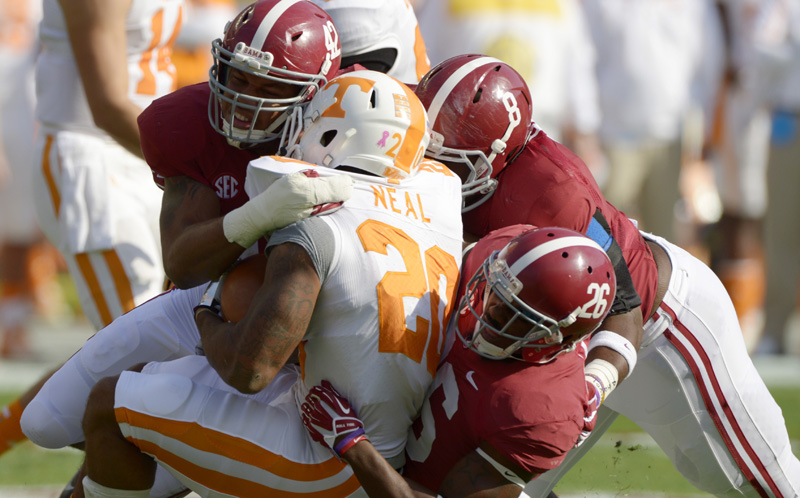Despite streaks, 'Third Saturday in October' still a big rivalry
TUSCALOOSA, Ala. — If you’re going to know one story about the University of Alabama’s rivalry with Tennessee, it’s the following:
In 1912, Alabama had the unusual distinction of having three Van de Graaff brothers playing at same time, something that wouldn’t happen again until 2004 with the Britts: linemen Wesley, Taylor and Justin.
In this case, Bully, Adrian, and Hargrove all hailed from Tuscaloosa. They also had another brother named Robert, who suffered a severe back injury and broken femur while playing quarterback in high school, but went on to invent the generator used to split the atom.
Hargrove was the team captain in 1913 when the game against Tennessee turned into the program’s first unofficial night event. Due to a number of injuries play lasted past sunset and spectators with automobiles were asked to encircle the Tuscaloosa field and turn on their headlights so it could continue.
Alabama held on for a 6-0 victory, marking the seventh straight shutout in the series, but what really stood out to the Volunteers was Bully.
“His ear had a real nasty cut and it was dangling from his head, bleeding badly,” Tennessee lineman Bull Bayer said about Alabama’s first All-American. “He grabbed his own ear and tried to yank it from his head. His teammates stopped him and the managers bandaged him. Man, was that guy a tough one. He wanted to tear off his own ear so he could keep playing.”
It still means that much to some people, and many Alabama fans consider Tennessee a bigger rival than Auburn.
Known as “The Third Saturday in October,” even though it’s often played during a different weekend, it dates back to 1901. That game was called due to darkness with the score tied 6-6, leading spectators to rush the field in Birmingham to protest. If anything, it certainly set the tone.
The rivalry reached a new level in 1928 when host Alabama was considered a sizable favorite. Before kickoff Volunteers coach Robert Neyland introduced himself to counterpart Wallace Wade, whom he had never previously met, and supposedly asked that the game be shortened if it got out of hand. Wade was taken aback, but agreed.
Tennessee’s Gene McEver returned the opening kickoff 98 yards for a touchdown and the Volunteers managed to pull off the 15-13 upset.
Neyland also may have paid the Crimson Tide its greatest compliment after the 13-6 game in 1934: “You never know what a football player is made of until he plays against Alabama.”
In 1935, Paul W. “Bear” Bryant played against Tennessee with a partially broken leg, but a year later when he was an assistant coach for Frank Thomas the Crimson Tide had first down at the Tennessee 1 as time ran out of the first half. The scoreless tie cost the Crimson Tide both the Southeastern Conference championship and a bowl appearance.
As a head coach one of the more memorable games for Bryant against Tennessee was in 1966, when the Crimson Tide hoped to win its third straight national championship, but found itself down 10-0 at halftime in Knoxville. Instead of lashing out at his players, Bryant calmly walked around the locker room and patted them on their backs. Alabama responded by scoring 11 points in the second half and Tennessee missed what would have been a game-winning field goal.
“If he’d kicked it straight, we would have blocked it,” Bryant said.
Somewhat similar was the epic 2009 game when Lane Kiffin’s Volunteers came very close to derailing Alabama’s national championship season, only to see Terrence Cody block his second field goal of the game as time expired, a 12-10 victory for the No. 1 Crimson Tide.
Consequently, when Kiffin showed up for his first day of work as Alabama’s offensive coordinator a few months ago a big photo of the play was waiting for him in his office. Maybe this time he’ll get a victory cigar out of it, a tradition that started when Bryant was coach and now both teams enjoy even though it’s considered a secondary NCAA violation.
That’s the other thing about this rivalry, the winning streaks. The first goes back to the Van de Graaffs, when Alabama won five straight and outscored UT 112-0. The Crimson Tide won 11 straight from 1971 to 1981, and seven straight from 1986 to 1992, while Tennessee is the only program to win seven in row against Alabama, which it did from 1995 to 2001.
Yet the Crimson Tide has won the last seven meetings, all since Nick Saban arrived in 2007, and the only close one was against Kiffin, who on Saturday will return to Knoxville for the first time since leaving for Southern California (7:30 p.m. ET, ESPN2).
“It is a big game,” Saban said. “When you play in these types of games it’s more about the rivalry than it is the current record or the statistics you achieved, the points you scored, the points you’ve given up. One of the things you’ll probably get asked one day down the road is, ‘What was your record when you played Tennessee?’”
“Hopefully I can say 4-0,” senior safety Nick Perry said.

